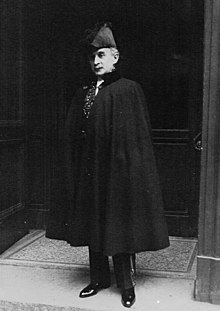Abel Bonnard
Abel Bonnard (born December 19, 1883 in Poitiers , † May 31, 1968 in Madrid ) was a French poet and novelist. His early upbringing began in Marseille with secondary studies at the Lycée Louis-Le-Grand in Paris . As a literary student he was a graduate of the École du Louvre .
Life
Politically, he was a supporter of Charles Maurras , and his views turned towards fascism in the 1930s . He took part in the Weimar Poets' Meeting organized by the Nazi German cultural propaganda in 1941 and became Minister for National Education under the Vichy regime (1942–1944). He banned the traditional school history work of Albert Malet and Jules Isaac so that young French people would not be taught the history of France by an Isaac . In the role of Minister of Education, on May 15, 1942, in front of the opening speaker, State Secretary Jacques Benoist-Méchin, he gave the welcoming address on the occasion of the opening ceremony of the Arno Breker exhibition in the Musée de l'Orangerie , a major event in cultural collaboration in occupied France.
The nationalist political satirist Jean Galtier-Boissière gave him the nickname “la Gestapette”, which was a portmanteau of the Gestapo and “tapette”, a slang term for a homosexual . This name and the attribution of his alleged sexual orientation subsequently became widely known.
He was one of the four members of the Académie française who were expelled from the institute after the Second World War because of collaboration with Germany . In absentia, he was sentenced to death for his wartime activities. He fled to Spain ; there he was granted asylum under the Franco government . In 1960 he returned to France to attend his retrial there . He was sentenced to a symbolic sentence of 10 years in exile from 1945 onwards. However, he was dissatisfied with the guilty verdict and returned to Spain, where he lived for the rest of his life.
Works
- 1906 Les Familiers
- 1908 Les Histoires
- 1908 Les Royautés
- 1913 La Vie et l'Amour
- 1914 Le Palais Palmacamini
- 1918 La France et ses morts
- 1924 Notes de voyage: En Chine (1920–1921), 2 vol.
- 1926 Éloge de l'ignorance
- 1926 La vie amoureuse d'Henri Beyle
- 1927 L'Enfance
- 1928 L'Amitié
- 1928 L'Argent
- 1929 Saint François d'Assise
- 1931 Rome
- 1936 Le drame du présent: Les Modérés
- 1937 savoir aimer
- 1939 L'Amour et l'Amitié
- 1941 Pensées dans l'action
- 1992 Ce monde et moi
Web links
- Literature by and about Abel Bonnard in the catalog of the German National Library
- Newspaper article about Abel Bonnard in the 20th century press kit of the ZBW - Leibniz Information Center for Economics .
- Short biography and list of works of the Académie française (French)
- Website about Abel Bonnard (French)
literature
- Patrick Neuhaus: The Arno Breker exhibition in the Orangery Paris 1942. Foreign cultural policy, art and collaboration in occupied France. Neuhaus Verlag, Berlin 2018, ISBN 978-3-937294-08-7
Individual evidence
- ↑ http://www.munzinger.de/search/portrait/Abel+Bonnard/0/8274.html
- ^ Patrick Neuhaus: The Arno Breker exhibition in the Paris Orangery in 1942. Foreign cultural policy, art and collaboration in occupied France. Neuhaus Verlag, Berlin 2018, ISBN 978-3-937294-08-7 , pp. 54-62
- ↑ Olivier Mathieu : Abel Bonnard, une aventure inachevée , Mercure, 1988, p. 188.
- ^ Jean-François Louette: Valéry et Sartre , in: Bulletin des études valéryennes , éd. L'Harmattan, 2002, p. 105, on line
| personal data | |
|---|---|
| SURNAME | Bonnard, Abel |
| BRIEF DESCRIPTION | French poet and novelist |
| DATE OF BIRTH | December 19, 1883 |
| PLACE OF BIRTH | Poitiers |
| DATE OF DEATH | May 31, 1968 |
| Place of death | Madrid |
